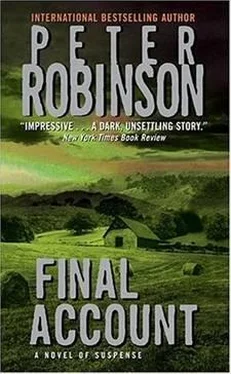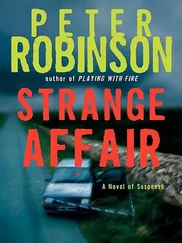In her blue jacket and matching skirt, carrying a briefcase and clipboard, she looked like a market researcher. A light breeze ruffled her tight blonde curls and a sudden burst of sun through the clouds dazzled her. She could smell rain in the air.
We know he’s not at home, she repeated to herself. He has cancelled his papers for three weeks and gone on a long holiday on the proceeds earned from killing Keith Rothwell. He doesn’t answer his telephone, and the two men observing the house over the past hour or so have seen no signs of occupation. So there’s nothing to worry about.
But still she worried. She remembered Keith Rothwell kneeling there on the garage floor in his suit, his head blown to a pulp. She remembered the tattered pieces of the girlie magazine, ripped images of women’s bodies, as if the killer had intended some kind of sick joke.
And she remembered what Ken Blackstone had told her about Jameson at the makeshift briefing in The Victoria. He had been kicked out of the army for rushing half-cocked, against orders, into an ambush that had killed two innocent teenage girls as well as one suspected IRA triggerman. After that, he had drifted around Africa and South America as a mercenary. Then, back home, he had beaten an Irishman senseless in a pub because the man’s Belfast accent hit a raw nerve. Since the GBH, he hadn’t done much except work on building sites and, perhaps, the occasional hit, though there was no evidence of this. He had four A-levels and an incomplete degree in Engineering from the University of Birmingham.
Susan looked around her as she walked. Bridgeport Road was a drab street of dirty terrace houses with no front gardens. From each house, two small steps led right onto the worn pavement, and the tarmac road surface was in poor repair. At the back, she knew, each house had a small bricked-in backyard, complete with privy, full of weeds, and each row faced an identical row across an alley. A peculiar smell hung in the air, a mix of raw sewage and brewery malt, Susan thought, wrinkling her nose.
Outside one or two houses, lines of washing propped up by high poles hung out to dry right across the street. A woman came out of her house with a bucket and knelt on the pavement to scour her front steps. She glanced at Susan without much interest, then started scrubbing. If Jameson really is our man, Susan thought, he’ll probably be looking for somewhere a bit more upmarket to live after he has laid low for a while.
There was nobody at home in the first two houses; the timid woman at number thirty-nine said she knew nothing about anyone else in the street; the man at number forty-one didn’t speak English; the West Indian couple at number forty-three had just moved into the area and didn’t know anyone. Number forty-five was out. Susan felt her heart beat faster as she lifted the brass lion’s head knocker of number forty-seven, Jameson’s house. She was sure the whole street could hear her heart and the knocker thumping in concert, echoing from the walls.
She had it all rehearsed. If the man with the puppy-dog eyes answered the door, she was going to lift up her clipboard and tell him she was doing market research on neighborhood shopping habits: how often did he use the local supermarket, that kind of thing. Under no circumstances, Banks had said, was she to enter the house. As if she would. As her mother used to say, she wasn’t as green as she was cabbage-looking.
But the heavy knocks just echoed in the silence. She listened. Nothing stirred inside. All her instincts told her the house was empty. She relaxed and moved on to number forty-nine.
“Yes?” An old lady with dry, wrinkled skin opened the door, but kept it on the chain.
Susan kept her voice down, even though she was sure Jameson wasn’t home. She showed her card. “DC Susan Gay, North Yorkshire Police. I’d like to talk to you about your neighbor Mr. Jameson, if I may.”
“He’s not at home.”
“I know. Do you know where he is?”
The face looked at Susan for some time. She couldn’t help but be reminded of reptile skin with slit lizard eyes peeping out of the dry folds.
The door shut, the chain rattled, and the door opened again. “Come in,” the woman said.
Susan walked straight into the small living room, which smelled of mothballs and peppermint tea. Everything was in shades of dark brown: the wallpaper, the wood around the fireplace, the three-piece suite. And in the fireplace stood an electric fire with fake coals lit by red bulbs. All three elements blazed away. There might be a chilly breeze outside, but the temperature was still in the mid-teens. The room was stifling, worse than Pratt’s office. As the door closed, Susan suddenly felt claustrophobic panic, though she had never suffered from claustrophobia in her life. A heavy brown curtain hung from a brass rail at the top of the door; it swept along the floor with a long hissing sound as the door closed.
“What’s Arthur been up to now?” the woman asked.
“Will you tell me your name first?”
“Gardiner. Martha Gardiner. What’s he been up to? Here, sit down. Can I get you a cup of tea?”
Susan remained by the door. “No, thank you,” she said. “I can’t stop. It’s very important we find out where Mr. Jameson is.”
“He’s gone on his holidays, that’s where. Has he done anything wrong?”
“Why do you keep asking me that, Mrs. Gardiner? Would it surprise you?”
She chuckled. “Surprise me? Nowt much surprises me these days, lass. That one especially. But he’s a good enough neighbor. When my lumbago plays me up he’ll go to the shops for me. He keeps an eye on me, too, just in case I drop dead one of these days. It happens with us old folk, you know.” She grabbed Susan’s arm with a scrawny talon and hissed in her ear. “But I know he’s been in jail. And I saw him with a gun once.”
“A gun?”
“Oh, aye. A shotgun.” She let go. “I know a shotgun when I see one, young lady. My Eric used to have one when we lived in the country, bless his soul. Young Arthur doesn’t think I know about it, but I saw him cleaning it through the back window once. Still, he’s always polite to me. Gives me the odd pint of milk and never asks for owt. Who am I to judge? If he likes to go off shooting God’s innocent creatures, then he’s no worse than many a gentleman, is he? Ducks, grouse, whatever. Even though he says he’s one of that green lot.”
“How long ago did you see him with the shotgun?”
“Couldn’t say for certain. Time has a funny way of moving when you’re my age. Couple of months, perhaps. Are you going to arrest him? What are you going to arrest him for? Who’ll do my shopping?”
“Mrs. Gardiner, first we’ve got to find him. Have you any idea where he went?”
“How would I know? On his holidays, that’s what he said.”
“Abroad?”
She snorted. “Shouldn’t think so. Doesn’t like foreigners, doesn’t Arthur. You should hear him go on about the way this country’s gone downhill since the war, all because of foreigners taking our jobs, imposing their ways. No, he’s been abroad, he said, and had enough of foreigners to last him a lifetime. Hates ’em all. ‘Foreigners begin at Calais, Mrs. Gardiner, just you remember that.’ That’s what he says. As if I needed reminding. My Eric was in the war. In Burma. Never the same, after. England for the English, that’s what Mr. Jameson always says, and I can’t say I disagree.”
Susan gritted her teeth. “And all he told you was that he was going on holiday?”
“Aye, that’s what he told me. Likes to drive around the English countryside. At least that’s what he’s done before. Sent me a postcard from the Lake District once. He wished me well and asked me to keep an eye on his place. You know, in case somebody broke in. There’s a lot of that these days.” She snorted. “Foreigners again, if you ask me.”
Читать дальше












